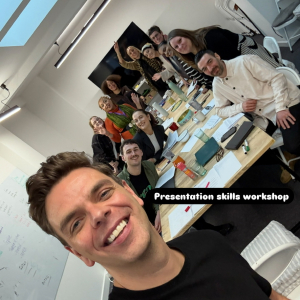-
.
Displaying items by tag: communication skills
Coldplay at Wembley - a Masterclass in Communication
Make your audience feel something....
At The Presenter Studio we love looking to all different types of communication for inspiration...
And this week's experience was Coldplay 2025 at Wembley Stadium!
A masterclass in live performance.
It was a sensory overload of music, words, and light. A night where people came together to be free and…well happy!
It’s a great reminder that how we communicate can really change how people feel. Coldplay are masters at that. It’s not just a concert. It’s an experience. It’s a message packaged up in a series of songs.
Great to spend the night there with fellow Presenter Studio boss Leon!
A real night to remember!
#communicationskills
Why a Presentation Skills Course Could Be the Game-Changer You Need
For many professionals, presenting can be a nerve-wracking part of the job. Whether you're pitching ideas in a boardroom or addressing a virtual team meeting, strong presentation skills can set you apart. But these skills aren’t something you're born with—they're learned, developed and fine-tuned.
That’s where a presentation skills course comes in. At The Presenter Studio, we bring a unique, real-world approach. Unlike generic workshops, our training is created by TV professionals who know what it takes to engage an audience. It's not about being perfect; it's about being authentic, clear and confident.
We focus on practical tools that suit your style. From structuring your content to finding your natural performance, our coaching helps you create presentations that people remember for the right reasons. It’s ideal for professionals at any stage—whether you dread public speaking or want to polish your delivery for high-stakes moments.
When done right, a presentation skills course is more than a one-off workshop—it’s a turning point in how you communicate.
Learn more at: https://www.presenterstudio.com/business-presenter-training/presentation-skills-training
Presentation Skills Coaching - Kerb
A great business presenter coaching session for the team at KERB on presentation skills.
A tailor-made session all around finding your voice and building confidence in presentations.
It was a joy to work with the team. 12 clients. 4 hours. A packed session full of great learning around finding your voice, developing your own style, and working with the brand of Kerb.
Thanks everyone for making us feel so welcome and for so much great work!
Communication Skills - 8 Tips for Success
In the world of presenting, communication skills are not just an asset; they are the foundation of success. Whether you’re hosting a live broadcast, interviewing guests, or delivering a pre-scripted segment, your ability to connect with your audience hinges on how effectively you communicate.
At The Presenter Studio, we’ve worked with countless aspiring and professional presenters, and here are our top tips for mastering the art of communication.
1. Know Your Audience Before you say a word, understand who you’re speaking to. Is your audience young and energetic? Mature and professional? Tailoring your tone, language, and style to your audience is crucial to ensuring your message resonates. When you’re clear about who’s watching, you can adapt your delivery to match their expectations and interests.
2. Clarity is Key Great communicators make complex ideas simple. Avoid jargon, overly long sentences, or complicated vocabulary that might confuse your viewers. Instead, aim for a conversational style that feels approachable and easy to follow. Remember, your job is to deliver information in a way that’s both clear and engaging.
3. Master Non-Verbal Communication Words alone aren’t enough. Your body language, facial expressions, and gestures all contribute to how your message is received. Maintain Eye Contact: Whether you’re addressing the camera or speaking to a guest, strong eye contact helps build trust and connection. Be Expressive: Use your face and hands to emphasize key points, but don’t overdo it—you want to enhance your message, not distract from it. Stay Confident: Stand tall, use open gestures, and project confidence even if you’re nervous.
4. The Power of Your Voice Your voice is one of your most powerful tools as a presenter. To keep your audience engaged: Vary Your Tone: Avoid speaking in a monotone, which can make you sound dull or robotic. Use inflection to emphasize key points and convey emotion. Pace Yourself: Speak at a steady, conversational pace. Rushing can make you seem anxious, while speaking too slowly might lose your audience’s attention. Breathe Correctly: Diaphragmatic breathing supports a strong, clear voice and helps you manage nerves.
5. Active Listening Communication isn’t just about talking; it’s also about listening. Whether you’re interviewing a guest or engaging in a live discussion, active listening shows respect and builds rapport. Stay Present: Give your full attention to the speaker and avoid interrupting. Show You’re Engaged: Use nods, smiles, or verbal acknowledgments like “I see” or “That’s interesting.” Ask Follow-Up Questions: Demonstrate genuine curiosity by asking thoughtful questions that build on what the other person has said.
6. Practice Makes Perfect The best communicators weren’t born that way—they honed their skills through practice. Record yourself presenting and review the footage critically. What’s working? What could be improved? Better yet, join a professional TV presenting course like those offered at The Presenter Studio, where you’ll get expert feedback and tailored advice.
7. Adapt to Different Scenarios As a TV presenter, you’ll need to adjust your communication style for various situations: Live TV: Stay calm under pressure and be prepared to think on your feet. Interviews: Focus on making your guest comfortable while steering the conversation effectively. Pre-Recorded Segments: Nail your delivery while sticking to a script. Each scenario requires a slightly different approach, but the core of good communication—clarity, confidence, and connection—remains the same.
8. Be Authentic Audiences can sense when a presenter is putting on a persona. Instead of trying to be someone you’re not, focus on bringing your true self to the screen. Authenticity builds trust and makes you more relatable to your viewers. Start Your Journey with The Presenter Studio Effective communication is the cornerstone of every successful TV presenter’s career.
At The Presenter Studio, we specialise in helping presenters develop their unique voice and style, equipping them with the skills they need to shine in front of the camera. Whether you’re a complete beginner or an experienced presenter looking to refine your craft, we’re here to help. Explore our range of courses and resources to take your presenting skills to the next level.
You can read about our communication skills courses here: https://www.presenterstudio.com/business-presenter-training
The Psychology Behind Great Presentation Skills
The Psychology Behind Great Presentation Skills
Introduction
Behind every great presentation is a solid understanding of psychology. Whether it’s capturing attention, building trust, or inspiring action, psychological principles play a crucial role in effective presentations. In this article, we’ll dive into key psychological techniques...
1. Understand Your Audience’s Needs
Great presentations begin with empathy. Take time to analyze your audience’s interests, concerns, and goals. When your content resonates with their needs, you build trust and establish relevance. This psychological alignment encourages active listening and engagement.
2. Leverage the Power of Storytelling
Stories are deeply rooted in human psychology—they evoke emotion, foster connection, and make information more memorable. Incorporate personal anecdotes or relatable narratives into your presentation to captivate your audience and reinforce your message.
3. Use Visual Cues to Aid Memory
The human brain processes visuals much faster than text. Infographics, charts, and images help simplify complex concepts and enhance recall. Use visuals strategically to emphasize key points and maintain attention.
4. Build Confidence Through Preparation
Confidence is contagious, and a confident speaker instills confidence in their audience. Preparation is the key to exuding confidence. Rehearse thoroughly, anticipate questions, and use positive visualization techniques to feel more self-assured.
5. Apply the Principle of Reciprocity
Reciprocity is a psychological concept where people feel compelled to return a favor. In presentations, offering valuable insights, free tools, or actionable advice creates goodwill and encourages audience engagement and cooperation.
6. Create Emotional Impact
Emotion drives action. Whether it’s excitement, curiosity, or urgency, evoke emotions that align with your message. Use powerful language, compelling visuals, or poignant anecdotes to connect with your audience on a deeper level.
7. Establish Authority and Credibility
Audiences are more likely to trust and listen to speakers who demonstrate authority. Share your expertise, reference credible sources, and communicate confidently. Your perceived authority will bolster your audience’s faith in your message.
8. Use the Principle of Social Proof
Humans are influenced by the actions and opinions of others. Highlight testimonials, case studies, or statistics that show how others have benefited from your ideas. This builds trust and reinforces your message.
9. Manage Cognitive Load
Overloading your audience with too much information can lead to disengagement. Break down complex ideas into digestible segments, focus on one key message at a time, and provide pauses for your audience to absorb the content.
10. End with a Call to Action
The psychology of persuasion emphasizes the importance of a clear call to action. End your presentation by summarizing your main points and providing your audience with a specific action they can take, whether it’s adopting your ideas, signing up for a service, or exploring further resources.
Conclusion
The psychology behind great presentation skills goes beyond what you say—it’s about how you connect with your audience on a cognitive and emotional level. By understanding and applying these psychological techniques, you can elevate your presentations, inspire your audience, and leave a lasting impression.
Top 10 Tips to Improve Your Communication Skills Today
Top 10 Tips to Improve Your Presentation Skills Today
Introduction
Strong presentation skills are essential in today’s professional world. Whether you’re pitching an idea, speaking at a conference, or addressing your team, the ability to deliver a compelling presentation can set you apart. In this article, we’ll explore 10 actionable tips that can help you elevate your presentation skills and captivate any audience.
1. Know Your Audience
Before crafting your presentation, take the time to understand your audience. What are their interests, needs, and expectations? Tailoring your content to resonate with them will make your presentation more impactful.
2. Start Strong with a Hook
First impressions matter. Begin your presentation with a powerful opening—a startling statistic, a question, or a short story. A strong start grabs attention and sets the tone for the rest of your talk.
3. Structure Your Content Clearly
A well-organized presentation is easier to follow. Use the classic structure: introduction, main points, and conclusion. Signpost transitions between sections so your audience knows where you’re taking them.
4. Practice, Practice, Practice
Rehearsing is one of the most effective ways to improve your presentation skills. Practice aloud multiple times, and if possible, in front of a friend or colleague who can provide feedback.
5. Use Visuals Wisely
Slides should enhance your message, not distract from it. Use visuals such as graphs, images, and short bullet points to support your key points. Avoid overloading slides with text.
6. Master Your Body Language
Nonverbal cues like eye contact, gestures, and posture are as important as the words you say. Stand confidently, use open gestures, and make eye contact with your audience to establish a connection.
7. Engage Your Audience
Encourage interaction by asking questions, inviting comments, or incorporating activities. Engaged audiences are more likely to retain information and enjoy your presentation.
8. Manage Nervousness
Nervousness is natural, but it can be managed. Techniques like deep breathing, visualization, and positive self-talk can help calm your nerves and boost your confidence.
9. Pace Yourself
Speaking too quickly can overwhelm your audience. Practice pacing your speech, using pauses for emphasis, and varying your tone to maintain interest.
10. End with Impact
Finish strong by summarizing your key points and leaving your audience with a memorable takeaway. A call to action or a thought-provoking statement can leave a lasting impression.
Conclusion
Improving your presentation skills doesn’t happen overnight, but with consistent effort, anyone can become a compelling speaker. Use these 10 tips as a starting point to refine your skills and deliver presentations that captivate and inspire.
Cynthia Erivo - An Inspiration to All
So what did you do this weekend that inspired you?
We were super busy at running our 2 day Fast Track Presenter Programme with The Presenter Studio but found time to go to a fiends for dinner on Saturday and to The Royal Albert Hall on Sunday to see Jason Robert Brown and the amazing Cynthia Erivo.
And it's Cynthia that I've taken away as my inspiration. So much of communication is about passion. Getting others to connect with you. Inspiring others to learn, to take action and to absorb your message.
The power of Cynthia Arivo as a singer is her ability to bring a song to life - connecting to the lyrics, to the cadence of a song and giving a true story to an audience. There's nothing 'over done'. There's nothing 'performed'. There's nothing passive. Just a 100% connection to a story that she wants to bring to life.
We often ask our clients - where in your body are you speaking from? And often the reply is 'I don't know'. And then after some throught we often agree 'it's probably from inside your head'. But all communcators speak from the heart. They connect. They share a passion. And they bring something to life.
So next time you deliver a presentation, or a video for social media, or give a pitch speak from the heart...and see what happens.
#passion#singer#communication#presentationskillscoach#mediatrainer
Presentation Skills Training Opener
Presentation Skills Training
We offer something rather special and unique in the world of presentation skills training!
We design a bespoke training programme to suit your needs - from presentation skills to storytelling workshops.
You'll develop your own style, voice and unique presentations creating maximum impact.
Unrivalled experience based on 20+ years in the media producing TV's biggest shows and working with TV's biggest presenters.
We work with companies of all sizes - from global giants like Amazon to start-ups.
We work on an individual or group basis, in person or online - from two hour coaching sessions to full days training. Play the video to meet us!
- presentation skills training
- presentation skills coaching
- presentation skills training for politicians
- presentation skills course
- presentation skills
- how to be a good presenter
- how to be a good speaker
- zoom presentations
- zoom presenter training
- presenting online
- presentation coach
- how to give a presentation
- storytelling
- communication skills
- public speaking
Presentation Skills Training Main Content
We offer something extra special in the all-too-grey world of presentation skills training and presentation skills coaching.
Our bespoke coaching sessions are tailor-made to your needs - so get in touch and we will design a bespoke programme for you and your team - helping you have the maximum impact.
We have detailed 360° approach so will advise you on everything from your script to your visuals, ensuring that your presentation is authentic and impactful.
We work with clients on a wide range of presentation work - business events, online presentations, webinars, internal meetings, public speaking, storytelling workshops, communication skills, social media content and much more.
Here are five things that make our presentation skills coaching special:
1: WE ARE BAFTA AWARD-WINNING PRESENTER COACHES WITH OVER 20 YEARS EXPERIENCE: We have an exceptional track record working with clients of all levels of experience.
2: WE HAVE WORKED WITH THE WORLD'S TOP BRANDS, PRESENTERS, AND BUSINESSES: It's our jobs to 'produce’ the Presenter and write their script, and we've worked with everyone from Claudia Winkleman, Graham Norton, Rylan Clarke, Zoe Ball, Sara Cox to Christine Lampard and we've also worked with international stars from David Beckham OBE to Madonna to politicians. And we've coached incredible global brands including NIKE, Prudential, ASOS, Porsche, The Guardian, SKY, Vogue and so on!
3: WE WILL DESIGN A BESPOKE PRESENTATION SKILLS TRAINING PROGRAMME FOR YOU: Everything we do is bespoke. We don’t have a 'one size fits all' approach to presentation skills. We'll do extensive research into your business, your audience or customer and the context of your presentation. All our sessions are detailed, expert led, and unique to your needs. Our training is perfect for you and your team to build confidence in their communication skills, storytelling, public speaking and internal presentations.
Our sessions will focus around two essential ingredients:
- 1 - Your Presentation Skills and Delivery - we'll give you the tools to develop your personal brand so you can develop your own style, and find your authentic voice.
- 2 - Your Script and Content – we'll help you refine your message, make everything work with the brand of the business, and help with scripts, slides and all your content needs.
Our bespoke presenter training work can be of any duration to suit your needs - from two hour coaching sessions, to group sessions across full days. We've coached clients on everything to hosting monthly meetings, to key-note presentations, to virtual and hybrid events, to storytelling, to dealing with nerves, to content creation for your influencers on social media, to in-store demonstrations, to public speaking and Ted Talks.
4: AN EXCEPTIONAL TRACK RECORD: We have an exceptional client list, and work with businesses big or small and with CEOs, business owners, politicians, sports stars and journalists - ASOS, Prudential Plc, Red Bull, Sage, Porsche Racing, NIKE, National Pharmacy Association, Virgin Media Business, AOL, Simpson Millar Solicitors, The Huffington Post, The Guardian, Lush, Conde Naste, Rosemary Water, ATD Direct, WCRS, GQ, Vogue, Fenty Beauty, SKY, KVD beauty, SEGA, Ole Henriksen.
5: A 360° CREATIVE APPROACH: We are experts in content creation and production so will feedback on every aspect of your presentation or event from your visuals, to your set, to your staging. We'll help you stand out from the crowd, and realise that presentations are a truly exciting thing to do!
Everything is bespoke to you and your type of presentation, ensuring we get exceptional results. The length of our presenter coaching sessions are also bespoke to your availability.
We can discuss the various options:
OPTION 1 - One-to-one two hour coaching sessions in person or online.
OPTION 2 - One-to-one full day(s) or half day coaching in person or online.
OPTION 3 - Group coaching sessions, in person or online of all durations (from two hours to numerous days).
PRIOR TO YOUR PRESENTATION SKILLS TRAINING SESSION - WE RESEARCH YOU, YOUR BUSINESS AND YOUR NEEDS:
In advance of our presentation skills coaching session we’ll send you a form to fill in. This allows you to share more information about your company, customer, and service so we can get to know you, your business and your needs. We'll then undertake detailed research into your business, brand, and customer – from looking at your website to social media to any previous presentations or content. And we'll look at the type of presentations you are doing - public speaking, internal presentations,
WE THEN DESIGN A BESPOKE PRESENTATION SKILLS TRAINING SESSION - FROM PUBLIC SPEAKING TO COMMUNICATION SKILLS:
Based on your needs, our research, length of the session, and number of attendees we will design your bespoke training package. If you want us to look into a specific area of presenting for a specific session we do that too - just get in touch, and we'll then develop a programme for you. Clients have asked us to run sessions on 'building confidence', 'presenting on stage', 'social media content' to 'storytelling workshops'...
THE TRAINING SESSION – STARTING WITH AN INITAL EXPLORATION OF YOU, YOUR BUSINESS AND YOUR AUDIENCE:
Our sessions are both practical and informaton led with detailed individual coaching and feedback.
We always start with an evalutation of you, your business and your customer - putting all of our work into context. We’ll look to discuss some crucial areas:
- How you want to come across.
- What is the brand of your business.
- Who is your core audience/customer.
- Your key purpose.
- What you personally and professionally want to achieve from your presentations.
WE’LL DEVELOP YOUR PERSONAL BRAND:
Presentation training can do more harm than good if it’s not personal to you. Our coaching sessions help you develop your own voice and style, ensuring you come across as authentic and ‘on brand’. We will enourage you to find your own language and your own type of presentation.
ENSURING YOUR PERSONAL BRAND WORKS WITH YOUR BUSINESS:
We’ll ensure your presentation works with the brand of your business and suits your customer/audience.
WE’LL EXAMINE YOUR CONTENT:
We are experts in script writing and will ensure that your scripts are personal to you and have the desired impact. We’ll explore these key areas:
- A clear purpose.
- Dynamic structure.
- Language that is personal to you.
- Clear take-out.
- Maximum impact.
OUR CHECK LIST OF ESSENTIAL DO’S AND DON’TS:
Our check list of do’s and don’ts will take your presentations to the next level and look at both how to be a good presenter, but also how to structure, write and craft a good presentation.
ENSURING YOUR VISUALS AND SLIDES HAVE IMPACT:
If you are using slides they can be the death of a presentation, and presentations can rely too heavily on them. We will help you use slides more effectively and for maximum impact.
A 360° APPROACH - THINK OF THIS AS A CREATIVE OPPORTUNITY:
Each presentation you do should start as a blank piece of paper. It's a creative opportunity to come up with dynamic ideas. We will develop every aspect of your presentation – from your delivery, to your music, to your visuals, to what you wear.
ON-THE-DAY COACHING:
If you need us to come to the event on the day we can - working with you in the space can put the icing on the cake.
We work with a whole range of businesses around the world - big and small.
Our clients are repeat customers, and we pride ourselves on good relationships.
Our clients include ASOS, Prudential Plc, Red Bull, Sage, Porsche Racing, NIKE, National Pharmacy Association, Virgin Media Business, AOL, Simpson Millar Solicitors, The Huffington Post, The Guardian, Lush, Conde Naste, Rosemary Water, ATD Direct, WCRS, GQ, Vogue, Fenty Beauty, SKY, KVD beauty, SEGA, Ole Henriksen.
And we've worked with many high profile celebrities including Zoe Ball, Dermot O'Leary, Claudia Winkleman and sports stars including Mark Webber, Bonita Norris, and Colin Jackson CBE.
Check out our amazing testimonials on the next page.
Here are a sample of the amazing testimonials we receive from our clients:
“You blew us away. It was the best session we have ever had. The feedback from everyone has been incredible. Everyone found it fantastic, energising and well thought out. I will highly recommend you to other parts of the business. It was brilliant".
SKY
“Everyone was really impressed. Thanks again for making it so easy!”
Virgin Media Business
“Some great sessions with great learning.”
ASOS
“I’d recommend this to anyone.”
AOL
“A big thank you! Your coaching made a huge difference.”
Prudential Ltd
“I just wanted to say a huge thanks. The feedback has been brilliant. And it was thoughly enjoyed by all”
KENDO - Fenty Beauty, KVD Beauty, Ole Henriksen.
“Working with The Presenter Studio is great, easy going and fun, but still totally professional. I look forward to working with them again.”
Colin Jackson CBE.
“Thanks again for the session. Everyone got so much out of it. You guys really know what you are doing!”
SEGA.
“They are fun but super professional to work with. I learnt a lot in a short space of time, cheers!”
Mark Webber, Porsche
“I wish I'd done this years ago. I will definitely be recommending you! Thanks loads.”
Bonita Norris - Everest Climber and Motivational Speaker
“It was a great success and all your support paid off. Thanks!”
The Guardian
“Thanks so much for all you taught me. This has given me the confidence and knowledge to be much better at what I need to do.”
Red Bull
“I’m now so much more confident.”
National Pharmacy Association
“I learnt so much from your feedback to everyone. Thanks so much for your candor and constructive critique. You did a wonderful job especially given that it was a virtual experience!”
Strategic Development Network
“This was just excellent. Thankyou for designing such an engaging tailored session.”
Newcastle University
“Thanks once again for the training day. We have received excellent feedback from the team!”
GAMA Healthcare.
“Thank you so much for an amazing session. The feedback from the team was great with everyone feeling really engaged!"
KERB food.
CASE STUDY 1
CLIENT: SKY
BRIEF:
To train 89 of the SKY team as part of their away day experience in presentation skills for online, meetings, and general presentation work.
THE PROCESS:
After initial conversations with the team we developed a bespoke training programme covering everything from presentation skills, to content creation.
THE TRAINING DAY:
We had 3 hours to coach 89 clients flown from all over the world to work with us. Clients worked in teams and received individual coaching around various exercises.
WHAT SKY SAID:
“You blew us away. It was the best session we have ever had. The feedback from everyone has been incredible. Everyone found it fantastic, energising and well thought out. I will highly recommend you to other parts of the business. It was brilliant".
SKY

CASE STUDY 2
CLIENT: PRUDENTIAL PLC
BRIEF:
These were two hour 1-to 1 in person coaching sessions at Prudential's offices in London for two of their Executive Directors. They were both giving a presentation at the company's annual review..
In advance of the sesssion we were sent their forms, scripts and sent a proposal for approval, and then we designed a bespoke presentation skills training programme.
One Executive Director was going to be the host of the event. The other was giving a 30 minute presentation. Prudential Plc are a regular client.
FINDING THEIR BRAND:
We worked with the client on their personal brand – how do they want to come across, and what do they personally want to get out of the event? And we explored the brand of the business, the purpose and tone of the event – how do Prudential want to come across, what is their overarching message and how can we best capture this?
WORKING ON THEIR SCRIPT AND BEING CREATIVE:
We gave feedback on their scripts, which lacked personality, shape, structure, tone and weren't written for their voice. We explored ideas on how they could be more impactful, from how to use the audience, music, to is ’30 minutes’ really necessary'? We came up with a ‘watercooler moment’ for the end of one client's speech - he wanted to get people talking, it was a tough one to pull off, but he did it!
And for the one client who was the host we very much worked with her to embrace and maximise the opportunity - making it personal, varied, punchy, and fitting for the event.
WORKING ON THEIR PRESENTATION SKILLS:
We worked on their presentation skills, focusing on shape, tone, message, personality, pace – all things that when combined help to pull off a winning presentation. There was a long list of practical things we worked through – confidence, how to remember the script, visuals, microphone technique, and how to control nerves, entrance music, use of the stage...
THE CLIENTS RECEIVED FANTASTIC FEEDBACK:
And both speakers had fantastic feedback, and we continue to work with Prudential Plc.
"A big thank you! Your coaching made such a difference." Cathy Lewis, Non Executive Director Prudential International Assurance.
"The event was a huge success and your support really paid off." Brad Jennings, Director of Transformation Engagement, Prudential Assurance.
CASE STUDY 3
CLIENT: SAGE
BRIEF:
A one day presenter training and presentation skills coaching session for 4 members of staff - to include both on camera presenting work and presentation skills.
DETAILED PREPARATION AND RESEARCH:
Each attendee is sent a form, where they can tell us about themselves, their business, their role, the type of presenting they do, and what they want to get out of the day.
A BESPOKE TRAINING PROGRAMME:
We then designed a day's presenter training including writing scripts to workshop, and booking camera crews and lighting.
AM: ON CAMERA WORK. PM: PRESENTATION SKILLS:
The morning focussed on on-camera presenting, and the afternoon on presentation skills.
We started by taking a step back, looking at the brand of the business, their customer, the ambition of the business and the purpose of their video content. This ‘re-group’ really helps the clients to revaluate, refocus and puts everything we do into context.
DEVELOPING YOUR PERSONAL BRAND:
We discuss the importance of finding your own voice, but one that works within the voice of the business – and that is the core purpose of the whole day – to explore, develop and establish each individual’s presenting style.
OUR DO’S AND DON’TS:
There are no general rules to how to be a 'good presenter' – instead it's all about embracing your points of difference. So we chat you through our checklist of things to think about when it comes to being ‘you’ and ‘believable’ on camera.
ON CAMERA WORK:
We worked with the clients in lots of different ways, with and without scripts. Each exercise is about building their brand, with detailed feedback and individual coaching.
SCRIPTS AND DEALING WITH INFORMATION/TAKE-OUT:
Scripts play a big part in what we do – the foundation to a good presenter is understanding what makes a good script, how to make it your own, and how to deal with any information you might need to get across.
PRESENTATION SKILLS:
The afternoon was spent looking at presentation skills. We started off with our do’s and dont’s on everything from structuring and writing scripts and content, before giving feedback on the scripts they had previously written.
Much time was then spent rewriting scripts, before we worked with each person individually on delivering their new presentation in front of the room.
THEIR PERSONAL BRANDS:
We end the day discussing their personal brands, bringing together all the work we have done.
And we received fantastic feedback:
"Thanks so much to you! The sessions were amazing", Lise Colyer, Communications Sage Foundation.

- presentation skills training
- presentation skills
- presentation skills coaching
- corporate presenter training
- zoom presentations
- zoom presenter training
- presenter training
- presentation skills course
- how to be a good presenter
- how to deliver a good speech
- presenter coaching online
- presenter coaching for politicians
- presentation script
- media training
- on camera presenting
- key note speeches
- presenter coach
- storytelling
- communication skills
- public speaking








